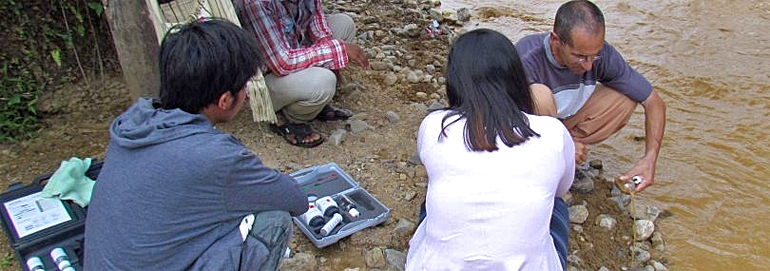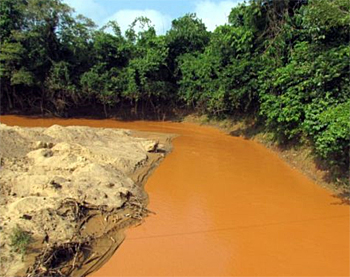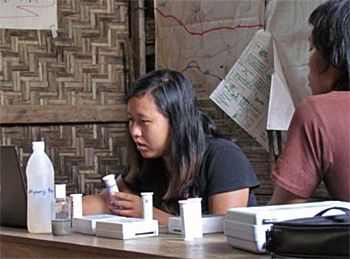Eijkelkamp supports private water quality assessment project in Myanmar
 The Eijkelkamp Foundation provided equipment to Lex van Gelder and his wife to measure the water quality in an area in Myanmar in order to investigate the increasing pollution of the local surface water.
The Eijkelkamp Foundation provided equipment to Lex van Gelder and his wife to measure the water quality in an area in Myanmar in order to investigate the increasing pollution of the local surface water.
Van Gelder and his wife have participated in various private aid projects in Myanmar in recent years. Noticing the deteriorating quality of the surface water they decided to map out the current situation.
The Royal Eijkelkamp Foundation provided them with various field kits including test strips for water quality measurement and a sieve set to conduct a sand filter demonstration.
The foundation is part of the Royal Eijkelkamp Earth Sampling Group and supports individuals who start a project to improve soil, water or environment.
 Polluted surface water
Polluted surface water
In October 2013 Van Gelder and his wife travelled to Myanmar for their water quality project to investigate the situation that local mining activities cause so much pollution that it endangers the local population’s drinking water supply. This supply mainly consists of surface water; streams are often used as water source for cooking, washing, agriculture and, of course, for drinking.
Baseline measurement
Van Gelder mapped out the current situation with an initial water quality measurement, a baseline measurement. Should further mining development result in pollution, the baseline measurement will enable this pollution to be verified. No tests had been carried out until this baseline measurement, which makes it difficult to demonstrate the presence of pollution: let alone ascribe responsibility to mining activities.
 Workshops and guest lessons
Workshops and guest lessons
Besides measuring water quality and taking samples, they also worked out local possibilities of setting-up small-scale drinking water purification in Burma. Through workshops and guest lessons at primary and secondary schools, they also educated locals about the importance of hygiene, hand-washing and clean drinking water.
Digging boreholes
In the next visit scheduled for this year, they will search for suitable groundwater with the aim of at least safeguarding drinking water quality by siting boreholes. As well as increasing the local population’s independence concerning a basic need, this will also result in logistical benefits.
Royal Eijkelkamp Foundation will provide a bailer boring auger set. Boring holes with the bailer boring auger set enables water to be detected at limited depths.
This news item was originally published on the website of Royal Eijkelkamp.
More information
Royal Eijkelkamp Foundation
Giesbeek, the Netherlands
+31 313 880 200
www.eijkelkamp.com



